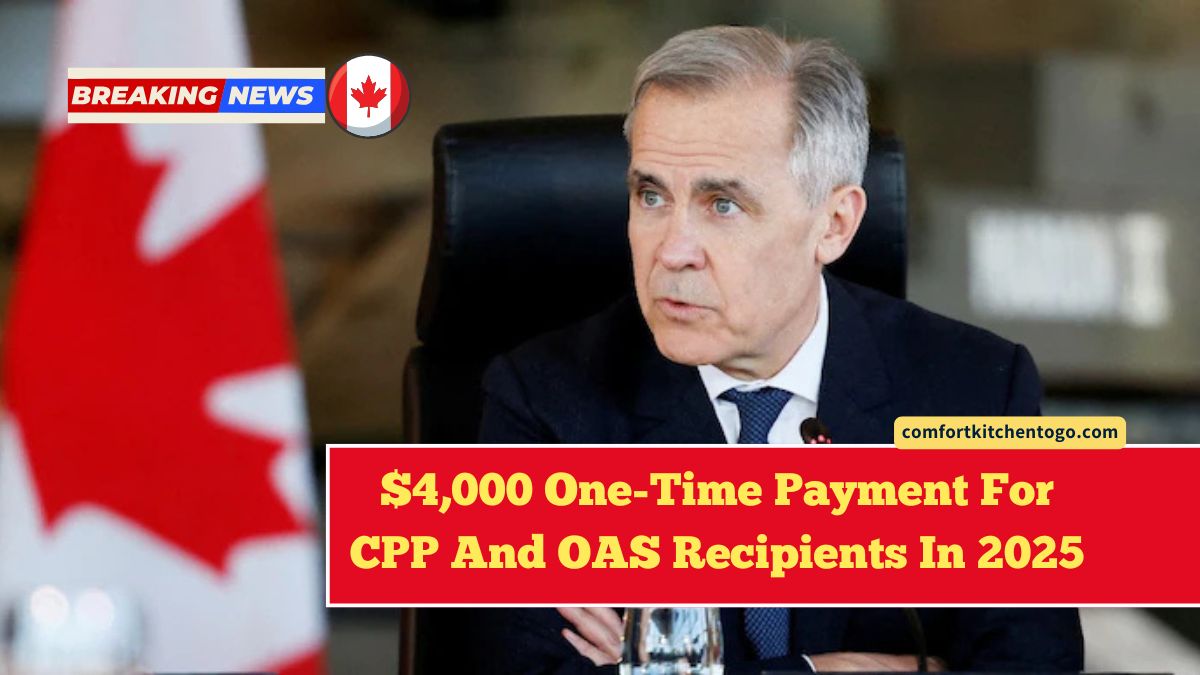A potential $4,000 one-time bonus for CPP and OAS recipients in 2025 is generating buzz across Canada. While still awaiting official confirmation, this proposed benefit aims to offer financial relief to seniors struggling with inflation, rising rent, and healthcare costs.
The bonus could serve as a game-changer for retirees on fixed incomes—providing flexibility and breathing room during uncertain economic times.
Here’s a detailed breakdown of everything known so far, including eligibility, application process, and the expected payment timeline.
What Is the $4,000 CPP & OAS Bonus?
The proposed $4,000 bonus is a one-time payment that may be issued to eligible recipients of the Canada Pension Plan (CPP) and/or Old Age Security (OAS) in 2025.
Though it has not been officially announced by the government, discussions and speculation suggest it could follow the precedent of earlier support programs—such as the $500 senior benefit issued in 2021.
If approved, this financial measure would offer crucial support to retirees as part of Canada’s broader strategy to offset inflation’s impact on seniors.
Proposed Eligibility Criteria
Based on prior benefit frameworks, the following eligibility conditions are anticipated:
| Criteria | Expected Requirement |
|---|---|
| Age | Must be 65 years or older (CPP disability recipients may qualify) |
| Benefit Status | Must be currently receiving CPP and/or OAS payments |
| Residency | Must be a Canadian resident or long-term resident |
| Income Threshold | Likely targeted at low-to-moderate income individuals (possible cutoff similar to GIS thresholds) |
| Tax Filing Status | Must have filed 2024 income taxes for CRA verification |
These conditions ensure that the bonus reaches those most financially impacted and reliant on government support.
Why the Bonus Matters
This proposed bonus addresses several key concerns faced by seniors in 2025:
- Rising Cost of Living: From groceries to utilities, retirees are bearing the brunt of inflation.
- Fixed Incomes: Most seniors cannot increase earnings; extra support helps cover unexpected expenses.
- Economic Boost: Seniors often reinvest funds into local economies—healthcare, small businesses, services.
- Improved Wellbeing: A lump sum allows for better quality of life—be it hobbies, health treatments, or helping family.
How to Prepare for the Bonus
To ensure you’re ready if this payment is approved, follow these steps:
- Check My Service Canada Account
- Ensure all CPP and OAS details are current, especially banking info.
- File 2024 Income Taxes
- This step is crucial for CRA income assessment and eligibility confirmation.
- Monitor Government Announcements
- Updates will appear on Canada.ca or through major news outlets. No application will be necessary if the bonus is auto-issued.
- Consult a Financial Advisor
- Understand how a one-time bonus may affect your benefits or taxation.
Expected Payment Date
If approved, the $4,000 payment is likely to be issued in late 2025, potentially in the October to December window. Payments would be distributed via direct deposit for registered users or mailed cheques for others.
While the $4,000 CPP and OAS bonus remains a proposed measure, it reflects increasing government focus on supporting Canada’s senior population.
With inflation continuing to challenge retirement stability, such a payment could offer both immediate relief and long-term financial cushioning. Seniors should stay alert, keep their tax and benefit accounts updated, and be prepared to act swiftly if the plan is confirmed.
FAQs
Is the $4,000 CPP & OAS bonus confirmed?
No, it is currently a proposed benefit and not yet officially announced by the federal government.
Who is likely to be eligible for the bonus?
Those aged 65 or older, receiving CPP and/or OAS, who have filed their taxes and meet residency/income requirements.
Will the bonus be taxed or reduce other benefits?
If approved, the government may classify it as non-taxable, but it’s best to verify once full details are released.
